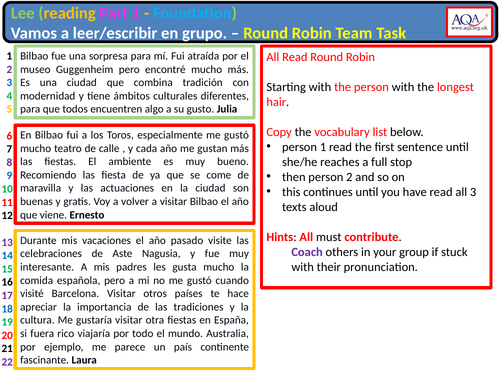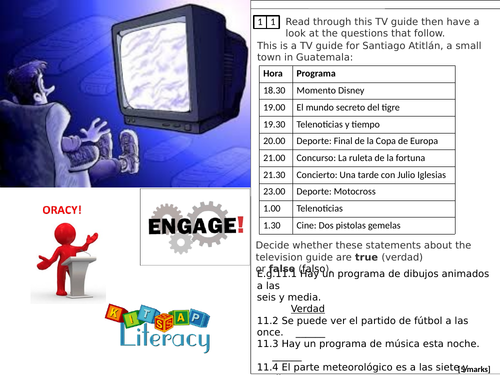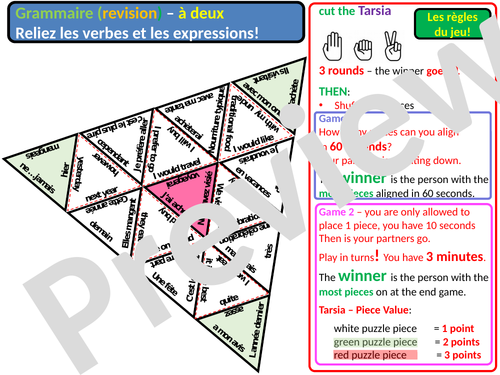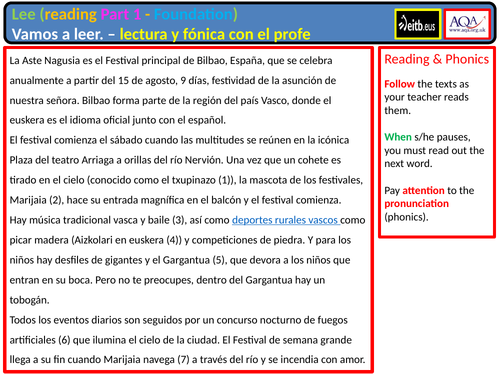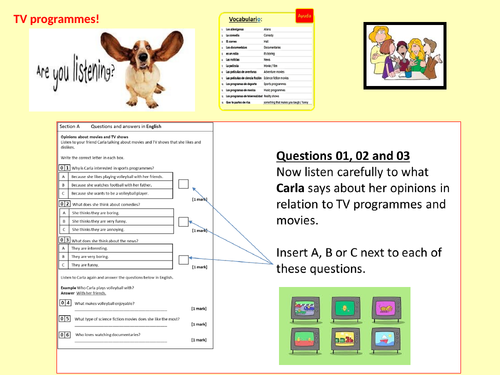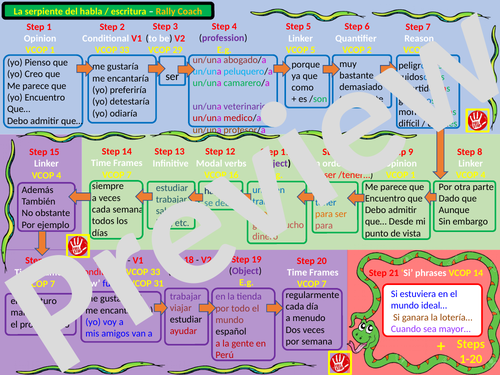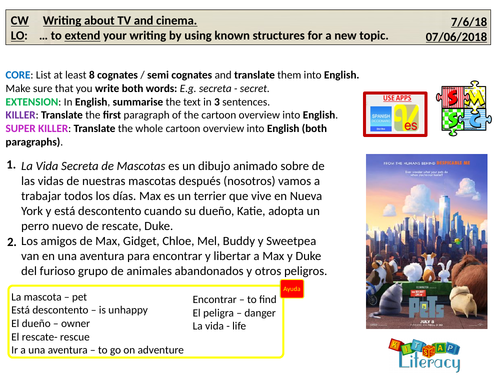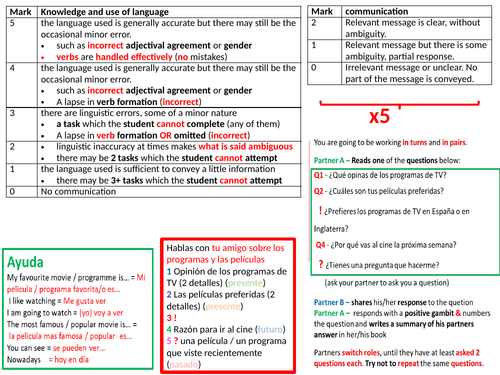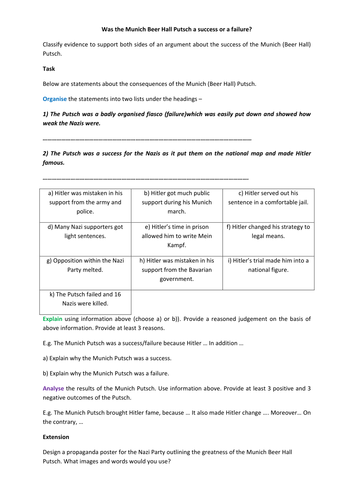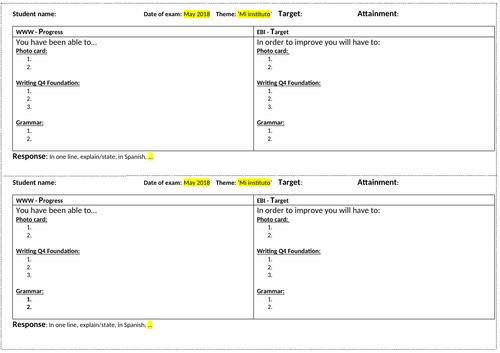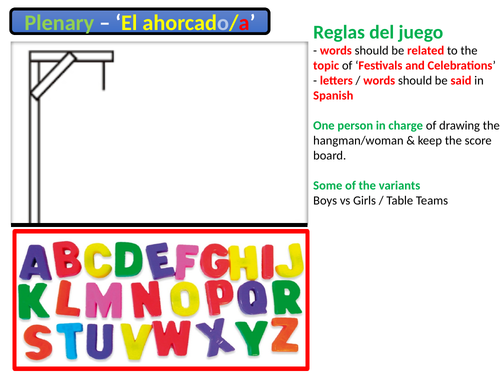
121Uploads
35k+Views
5k+Downloads
All resources

AQA GCSE Spanish - Writing (Foundation) answer strategy - Questions 2 and 4 / Higher Question 1
This is a template that I prepared for my higher year 8 Spanish students and early KS4 in relation to answering a Writing Foundation Questions 2 and 4 // Higher Tier Question 1. The topic of this example is celebrations / festivals.
Students begin by translating the short text into English and coaching each other if stuck at the same time assessing each other’s work. Then they revise some grammar by playing tarsia game (see template in the end of the presentation).
Consequently they get on with reading the question and what is required from them and discussing the what they could include in their answer (both content and grammar structures). Then they make a break and play a dice game (can be prepared prior to the lesson or during the same - see template in the end of the presentation) and a learning grid to revise verb tenses. They then get back to the task and work in pairs to plan their answers. Finally they complete the task individually, discuss the success criteria and the marking scheme with the teacher and peer / self assess their work.
Please let me know if there are any problems / ideas!

AQA GCSE Spanish - Reading Section B (Foundation) answer strategy / Aste Nagusia
This is a template of a set of activities that I prepared for my higher year 8 Spanish students and early KS4 in relation to answering a Reading Section B Foundation task (questions and answers in Spanish) with elements of Part A to explain the main concepts.
Please note that this is a template and can be reused for different topics. This one is related to the topic of festivals and celebrations. It is based on the texts about Aste Nagusia.
The students read the texts aloud (Oracy!) in turns as a class and then play an ‘air writing’ game which basically means they are trying to locate the words that the teacher asks them to find. Next they do a similar task, trying to answer in Spanish in which line is the word the teacher asked them to locate. Next they annotate keywords in groups trying to translate as many unknown words as possible (in a group - coaching each other). They then play a quick tenses game to revise how to identify present, past, immediate future and conditional verbs and how to correctly translate them into English.
Consequently they revise the strategies for approaching Reading Part A/B tasks and play a quick translation game. I then thought it would be useful if they quickly revise the Spanish question words by playing an online game (from the Language Gym website - free and useful!) and complete the Reading Part B task (differentiated).
Please let me know if there are any problems / ideas!
Bundle

AQA GCSE Spanish - Reading Sections A, B, C (Foundation) answer strategy
These are the templates that I prepared for my higher year 8 Spanish students and early KS4 in relation to answering Reading Foundation Sections A, B and C. They include different sets of reading activities and games to answer the questions of the Reading AQA exam. The tasks are set for my Foundation tier but might as well work for Higher if mildly redacted.
Please let me know how it goes!

AQA GCSE Spanish Games Roll-a-Word//Speaking Cube// OXO (speaking / writing /translation / revision)
These are few grammar games that I decided to share. I would use them for pretty much all age groups, both KS3 and KS4, GCSE both tiers. They can be easily amended to suit the grammar topics that you wish to reinforce / revise / introduce. The templates can also be easily reused for French.
See enclosed:
Roll-A-Word - Students roll a dice to complete different tasks related to the new and / or familiar words (both learning and revising). They count the value of the completed dices to make the task more competitive.
Speaking Cube - 6 sides of the cube are completed with the topic questions for the half-term. Students roll a cube (you can either ask them to glue them together or you can make them yourself). I figured 6 cubes per year for each year group is an easy enough task to continue repeating the questions of all half-terms for the whole school year. I included an origami version of the cube in case you wish to ask them to make the cube and to write the questions on their own (I took the scheme from the Google images so I do not claim any rights on that one.)
OXO - One of my favourite tasks to develop spontaneous speaking. Students play OXO in turns following the rules. The ? (= random/phantom question or topic) can be used to increase the level of complexity of the game. Furthermore, a certain set of rules can be imposed, e.g. ‘ensure you use a preterite tense of your choosing as main verb of the ‘!’ box. It can be played using ‘home and away’ tables, i.e. grouping students by ability bands, so that all low/medium/high band students play together, which might, for example, allow the teacher to put in place bespoke interventions to support those in need of guidance. I have included three templates of OXO that can be used as a speaking, writing and translation tasks, differentiated according to the level of knowledge and KS group. See noted for additional ideas and hints.
Let me know how it goes!

TV shows / TV program - Spanish- AQA GCSE Reading (Sec. A- T/F) differentiated
This is a lesson on TV shows for an early GCSE Spanish class which can be used with a higher year 8 students. The lesson includes a scrabble starter to wake the students up followed by phonics practice (resiting tongue twister!). Then I included few slides explaining how to use VES application to check the meaning of conjugated verbs and asked them to try to find few on their own to check understanding and to encourage them to be independent.
Then they practice phonics when pronouncing new words (see new vocabulary attached - quizlet) followed by the quizlet activity. Students are to choose what quizlet task they want to do based on their level therefore this engaging task is differentiated. Then I have included a set of slides to introduce a reading section A exam task text - TV program (please note that this is a task taken from BBC Bitesize website and I bear no right on it therefore) . There is also a differentiated Rally Coach activity to consolidate the knowledge of the new vocabulary after they looked at the task whereby they try to translate the sentences in relation to opinions on TV programs. Consequently they have a look at the TV program text again and complete a series of tasks to enhance their understanding - underline cognates, discuss unknown words in a group and learn how to use Spanish Dict application (an explanatory slide given). Finally they analise the way they should answer the questions (True / False) and complete the Reading task and self-assess their work. I have included the handout with the reading task to ease the pain.
Enjoy!

KS3/KS4 French-Speaking Cube/Tarsia/Conjugation Learning Grid Games (speaking / writing / revision)
These are two grammar games that I decided to share. I would use them for pretty much all age groups, both KS3 and KS4, GCSE both tiers. They can be easily amended to suit the grammar topics that you wish to reinforce / revise / introduce.
See enclosed:
Tarsia slide and template - an activity to use to revise topic / key vocabulary. Students can either create their own or just cut the one you prepare for them. They need to then match the words / expressions in English with their French equivalents.
Speaking Cube - 6 sides of the cube are completed with the topic questions for the half-term. Students roll a cube (you can either ask them to glue them together or you can make them yourself). I figured 6 cubes per year for each year group is an easy enough task to continue repeating the questions of all half-terms for the whole school year. I included an origami version of the cube in case you wish to ask them to make the cube and to write the questions on their own (I took the scheme from the Google images so I do not claim any rights on that one.)
Verb conjugation Learning Grid (differentiated) - Students roll two dices to identify the tense and the pronoun they need to use. To make the task more complicated for more advanced students I ask them to create a sentence using the verb they got with particular amount of words to further challenge higher tier students. I would highly recommend it for the KS4 students.
Let me know how it goes!

AQA GCSE Spanish - Writing (Foundation) answer strategy - Question 1
This is a template that I prepared for my higher year 8 Spanish students and early KS4 in relation to answering a Writing Foundation Question 1 (photo card).
Please note that this is a template and can be reused for different topics. This one is related to the topic of carnivals and celebrations.
It starts with a Quizlet slide to revise (whilst being engaged!) some vocabulary prior to looking at the task. There are various Quizlet word lists available so you can just change the QR code and link if another list of words is needed. Then Students together with the teacher discuss the strategies and look at the success criteria and marking scheme. Then they play few verb conjugation games to revise some useful verbs that they can use to describe the photo card later on in the lesson. Consequently they jot their thoughts on a different photo card (working in pairs / groups) and play a catchphrase game to get more ideas on the topic. Then they work in pairs to prepare a response to another (but similar!) photo card. Finally they do it individually and self/peer -assess their work.
Please let me know if there are any problems / ideas!

AQA GCSE Spanish - Reading Section A (Foundation) answer strategy / Aste Nagusia
This is a template of a set of activities that I prepared for my higher year 8 Spanish students and early KS4 in relation to answering a Reading Section A Foundation task (answers in English).
Please note that this is a template and can be reused for different topics. This one is related to the topic of festivals and celebrations. It is based on a text about Aste Nagusia from the official governmental website so the text is just mildly redacted to suit the level of the readers. See the link embedded in the image in the first slide.
The students read the text aloud (Oracy!) in turns as a class and then again in groups. Then they use their knowledge, dictionary / Apps to locate the meaning of unknown keywords and look at the pictures for these keywords. Then they play team challenge game to find the meaning of the Spanish verbs that appear in the text and check their answers. Next is the reading of the unrelated literary text in English in groups to exemplify that the meaning of the words in read (with jumbled letters) does not actually stop them from understanding the text.
Consequently they revise the strategies for approaching Part A tasks, play a quick translation game and complete the tasks (differentiated).
Please let me know if there are any problems / ideas!

Opinions on TV programmes - Spanish- AQA GCSE Listening (Sec. A- multiple choice / 1 detail asnwer)
This is a lesson on TV shows for an early GCSE Spanish class which can be used with a higher year 8 students.
The lesson includes a translation starter (mini-Reading Section C) to wake the students up followed by phonics practice (resiting tongue twister!). Then I included few mini-tests to recap / check understanding of basic grammar (articles, indirect object pronouns and adjectival agreement).
Then they get to know new words via online quizlet activity. Students are to choose what quizlet task they want to do based on their level therefore this engaging task is differentiated. Then I have included a quick match-up activity to check whether they remember the words they have just learned. I then introduce a Listening activity related to the opinions on TV watching preferences. It has two parts - multiple choice and one detail answer to account for two types of tasks in the Listening exam spec. Students complete a series of tasks to enhance their understanding - translate the keywords into Spanish to make the Listening easier, discuss unknown words in a group and use applications / dictionaries to find out the meaning of the unknown words. Finally they analise the way they should answer the questions , complete the task and self-assess their work. I have included the handout with the task to ease the pain. Please note that there is no listening file - see the end of the presentation for teacher’s handout and for the students one.
Enjoy!
Bundle

AQA GCSE Spanish - Speaking (Photo card, Role Play, Conversation) (Foundation/Higher) answer strategies
These are the templates that I prepared for my higher year 8 Spanish students and early KS4 in relation to answering Speaking questions (Photo card and Role Play as well as Conversation - see Writing Q2/Q4).
They include different sets of activities and games to answer the questions of the AQA GCSE exam. The tasks are set for my Foundation tier but might as well work for Higher if mildly redacted.
Please let me know how it goes!

KS3/GCSE Spanish-MAT-La serpiente del habla (Jobs)-independent Speaking/Writing (differentiated)
This is a differentiated Speaking / Writing exercise that I tend to use every half-term to encourage spontaneous speaking / writing. It is a variation of a trap door exercise that can be adapted for every topic as only topic specific vocabulary changes (not connectives / frequencies / opinions). This particular mat is to speak / write on the topic of (Future) Jobs / Employment plans.
Enjoy!

AQA GCSE French - Writing (Foundation) answer strategy - Questions 2 and 4 / Higher Question 1
This is a template that I prepared for my higher year 8 students and early KS4 in relation to answering a Writing Foundation Questions 2 and 4 // Higher Tier Question 1. The topic of this example is celebrations / festivals.
Students begin by translating the short text into English and coaching each other if stuck at the same time assessing each other’s work. Then they revise some grammar by playing tarsia game (see template in the end of the presentation).
Consequently they get on with reading the question and what is required from them and discussing the what they could include in their answer (both content and grammar structures). Then they make a break and play a dice game (can be prepared prior to the lesson or during the same - see template in the end of the presentation) and a learning grid to revise verb tenses. They then get back to the task and work in pairs to plan their answers. Finally they complete the task individually, discuss the success criteria and the marking scheme with the teacher and peer / self assess their work.
Please let me know if there are any problems / ideas!
Bundle

Free time: Cinema / TV- Spanish AQA GCSE/ older KS3 - 4 lessons + Project + Speaking frame (Reading, Listening, Writing, Speaking)
This is a bundle of 4 lessons and a research project in relation to the topic of Free-time activities, subtopic TV and cinema in the AQA GCSE specification (originally for the y8 / early GCSE year but can also be used for revision for years 10 &11). These lessons are prepared for the topic of general vocabulary on TV and cinema and opinions. Each lesson highlights different part of the exam hence the 4 of them have Reading, Listening, Writing and Speaking (Role-play) task. The bundle is finalised with the research project which includes the structures and grammar from the whole topic, that can be changed / adapted / differentiated further to your needs. I have also included the speaking framework for the Part 3 of the Higher Tier exam that can also be used in writing practice.

Writing: TV and cinema (opinions) - Spanish - AQA KS3/KS4 GCSE (Speaking / Writing)
This is a lesson on TV shows for an early GCSE Spanish class which can be used with a higher year 8 students.
The lesson starter is a differentiated reading / writing / grammar task based on the review of a famous cartoon - Secret Life of Pets. Students read the overview of the cartoon and complete the tasks. Then they check the answers followed by phonics practice (resiting tongue twister!). Then I included a mini-test to recap / check whether students remember how to conjugate ‘tener’ in present tense. Consequently they play the Speaking Cube - 6 sides of the cube are completed with the topic questions for the half-term. Students roll a cube (you can either ask them to glue them together or you can make them yourself). I figured 6 cubes per year for each year group is an easy enough task to continue repeating the questions of all half-terms for the whole school year. The template is in the end of the lesson in case you need to change the questions (colours correspond to the difficulty of the question (core- blue, extension is green, violet is killer and pink is super killer).
Then they get to revise verb 1 + verb 2 structure and complete a writing task. Before writing I tried to give them some ideas by showing them the Spanish trailer of the cartoon mentioned in the starter activity (they loved it!). The trailer is from Youtube. Finally they self/peer -assess their work by way of analising the success criteria and play a vocabulary game as a reward. The younger students might be allowed to use a dictionary or to think of any word. In any case, feel free to change the rules!
Please let me know if there are any problems / ideas! Enjoy!

Role-play: opinions on TV / movies - Spanish - AQA KS3/KS4 GCSE (Role-play)
This is a lesson on TV shows for an early GCSE Spanish class which can be used with a higher year 8 students.
The lesson starter is a recap on some simple concepts (articles / gender / adjectival agreement/ spelling) to wake the students up followed by phonics practice (resiting tongue twister!). Then I included a mini-test to recap / check whether students remember topic-related vocabulary.
Then they get to revise topic words via online quizlet activity. Students are to choose what quizlet task they want to do based on their level therefore this engaging task is differentiated. Then I have included a game - Roll-A-Word - Students roll a dice to complete different tasks related to the new and / or familiar words (both learning and revising). They count the value of the completed dices to make the task more competitive. Then they revise question words and how to form different types of questions in Spanish. They then jot their thoughts on a Role Play task in pairs (using grammar help - note: we use VCOP mat so if you have one you will need to change the numbers of the grammar points, if not you need to delete few bits, the examples of structures are provided anyway) and complete in in writing individually . Then their ‘Time Pair Share’ the Role Play and self/peer -assess their work by way of analising the success criteria (you might want to show it prior to the task for the novices).
Please let me know if there are any problems / ideas! Enjoy!

Who would be the perfect blind date for a Nazi?
This worksheet is for a 'blind date activity' that I have used for my 'Women in Nazi Germany' lesson. Since I recall initially taking it from TES community, I have decided to upload it here in addition to the actual lesson. Enjoy!

Was the Munich Beer Hall Putsch a success or a failure?
A worksheet for my lesson 'The Rise of the Nazi Party - Munich Putsch' which was taken from TES and adapted to the lesson.

AQA GCSE Spanish / French / KS4 / KS3 Assessment e-Feedback - blank template
Assessment e-Feedback - blank template if anyone finds it useful. I used for Spanish GCSE classes but it can be adapted for French or KS3. Have a look and let me know what you think!

GCSE Spanish - Vocabulary GAME - el ahorcado - Hangman slide
One of the most popular word games ever… And students love it as a reward for a good work during the lesson!

Spanish Trailer of Secret Life of Pets
Hi everyone! I realised that some things disappear from Youtube, including trailers which are very useful to engage students.
I have therefore downloaded this trailer to use for educational purposes only.


